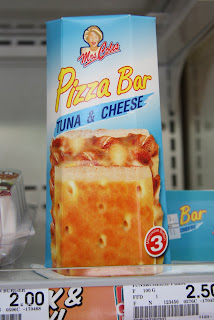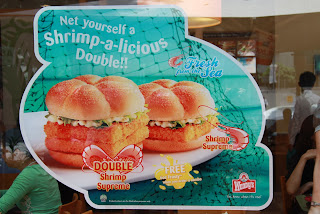 The exchange rate was almost 1 USD to 1 SD, making Singapore the most expensive country we've visited, besides Japan.
The exchange rate was almost 1 USD to 1 SD, making Singapore the most expensive country we've visited, besides Japan. Every time we left our hotel, we passed this damn, almost life-size naked dude reflexology chart. Every single time! And we always looked at it too!
Every time we left our hotel, we passed this damn, almost life-size naked dude reflexology chart. Every single time! And we always looked at it too!In 1980, during the restoration of a stupa in Myanmar, a tooth and other various artifacts of the Buddha were discovered. They were kept hidden for 22 years, until being passed into the hands of Venerable Monk Shi Fuzhou. Ven. Shi Fuzhou then took upon himself the duty of designing and funding the The Buddha Tooth Relic Temple and Museum.
Although our hotel was just blocks away from it, and we walked by many times, we never went in. During opening hours, there were always crowds of people bowing and praying in front of the building, either on their way in to worship or their way out from worshiping. To us, it didn't seem right going in and wandering around as non-Buddhists.
Claypot cooking is a common method in Southern China, Malaysia and Singapore. Generally, the rice is cooked in the bottom of the pot first and the other ingredients, such as chicken, cabbage, onions and soy sauce are added later, as they don't require as long to cook. Traditionally, claypot cooking is done with a charcoal heat source which gives the food it's distinct, smoky flavor. While in Singapore, we tried a few claypot dishes, and they were all about the same. They were good for a few bites, but the extreme amount of soy sauce became too over powering after a while.

In the late 1800's, the site of the Lau Pa Sat Festival Market was the first and only market within the city/state of Singapore. It served as one of the main centers of commerce for about 80 years, until in 1973, it was declared a national monument and completely reconstructed in 1990. Today, it is no longer a market, but a huge, food court / hawker center in the heart of downtown offering hundreds of dining options to the business men and women of Singapore.
We stumbled upon Lua Pa Sat right around noon on a workday, so the place was packed with the lunchtime rush. It was chaotic and frightening. For those reasons, we don't have many pictures of it.
 We didn't try it, so we don't know for sure, but this is most likely one of the grossest things that could be pulled out of a microwave.
We didn't try it, so we don't know for sure, but this is most likely one of the grossest things that could be pulled out of a microwave. Apparently, Santa spends his time during the off season in Singapore, moonlighting as a saxophonist at the Guo Fu Steamboat Restaurant.
Apparently, Santa spends his time during the off season in Singapore, moonlighting as a saxophonist at the Guo Fu Steamboat Restaurant.


 As always, we were outside of Korea, so we could buy real cheese... The baguette was still not quite up to European standards, but the stinky blue was spot on!
As always, we were outside of Korea, so we could buy real cheese... The baguette was still not quite up to European standards, but the stinky blue was spot on!












No comments:
Post a Comment